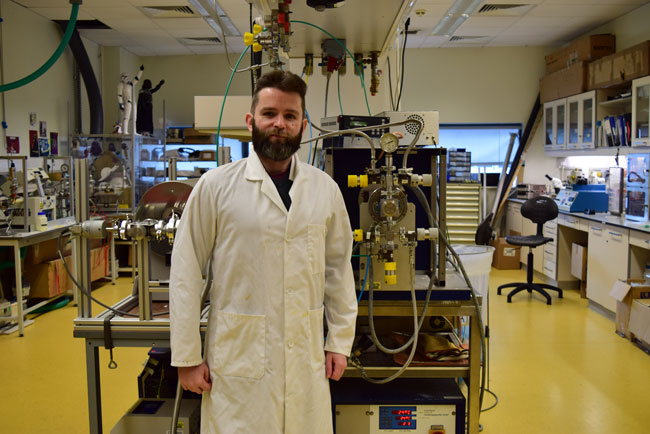A researcher in the Trinity-based Advanced Materials and BioEngineering Research (Amber) centre, Dr Niall McEvoy, has been awarded €500,000 by Science Foundation Ireland (SFI) for his work in transition metal dichalcogenides (TMDs), which have potential applications in the ICT and energy sectors.
The award, which is part of SFI’s prestigious Starting Investigator Research Grant Programme, will be awarded as a salary over four years to McEvoy and provide funding for a postgraduate student. It is given to researchers in early-stage careers to support them carrying out their own project. Investigators chosen for the award have to show that their projects potentially have economic and societal impact.
In a press release, McEvoy’s mentor and Amber Investigator, Prof Georg Duesberg, said he was very satisfied with the researcher’s work: “We see real opportunity with the production method Niall will employ to develop TMDs.”
McEvoy’s research focuses on TMDs, which is one family of 2D materials. TMDs’ properties offer opportunities for the fabrication of novel devices and device components in the applications areas of ICT and energy industries.
Duesberg explained by saying: “This is of particular interest to companies in the ICT industry, who may be able to use them to enhance the performance of devices. While a range of 2D materials are ultra-thin, flexible and conductive making them highly promising for future technologies.”
Amber Director, Prof Michael Morris, extended his congratulations to McEvoy for achievements at such an early-stage of his career and said that he looks “forward to advances in his research with TMDs, which has already gained interest from our industry partners in AMBER”.
The award will fund McEvoy’s research, whose study published in the journal ACS Nano about the properties of platinum diselenide, a type of TMD, showed that it could be grown at 400 degree Celsius, a lower temperature than traditional 2D materials. TMD could also offer an alternative to materials, like silicon, in the ICT Industry because of its higher performance due to its greater conductivity.
McEvoy’s publication also demonstrated that platinum diselenide could have further applications, particularly in the energy sector in the area of sensors and solar cells generating electrical power, exceeding performance seen in currently available commercial materials.
The announcement of the award came as part of the announcement by Minister of State for Training, Skills and Innovation, John Halligan TD, of €22.3 million from SFI’s Starting Investigator Research Grant and Career Development Award Programmes for research funding. The funding will be applied to 40 research projects supporting nearly 100 researchers across Ireland including nine projects in Trinity, with awards ranging from €450,000 to €877,000 applied over four years.
McEvoy graduated from Trinity in 2005 with a first class honours and a gold medal in materials science. He went on to complete a PhD in physics in 2011 in Prof Werner Blau’s Molecular Electronics group. For the past five years, he has worked with Duesberg in Amber and the School of Chemistry where he has previously been awarded funding from Intel, Hewlett Packard and the EU funded project Electrograph, and has recently worked on a SFI TIDA project.
Amber, which is based in Trinity and is funded by SFI and industry partners, encourages collaboration between scientists across Ireland into the development and research of materials, also saw today a separate investment of €2.3 million from SFI and Nokia Bell Labs.







